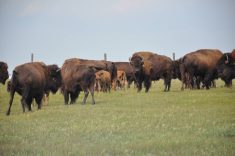The U.S. cattle industry is asking legislators to halt a bill that will appear before the Senate in the next few weeks calling for a dramatic increase in the renewable fuel standard, a stance supported by its Canadian counterparts.
The National Cattlemen’s Beef Association contends the Biofuels for Energy Security and Transportation Act of 2007 poses a serious threat to the $50 billion US cattle industry.
Bill S. 987 proposes to increase the renewable fuel standard to 36 billion gallons by 2022, up from the current mandate of 7.5 billion gallons by 2012. It establishes a de facto mandate of 15 billion gallons of grain-based ethanol by 2015.
Read Also

Canadian Food Inspection Agency slammed for handling of bovine tuberculosis case
The federal government leans heavily on producers to “take one for the team” and risk their livelihoods without any reassurance of support.
“The impact of a 15 billion gallon renewable fuels standard for feed grains-based ethanol will deal a serious blow to cattle producers if the United States experiences anything short of a new record for U.S. corn production,” said the association this month in a policy statement.
Jason Jordan, the NCBA’s manager of legislative affairs, said the government’s initial mandate has already created a thriving ethanol industry that is competing with the cattle sector for corn.
Existing ethanol plants and those under construction will soon be consuming 4.5 billion bushels of corn per year, roughly 35 percent of the anticipated 2007 domestic corn supply. The proposed new renewable fuel standard could boost that number to 43 percent of the crop.
The corn industry contends it will be able to keep up with the demand for its product through increased acreage and yields, but Jordan said one drought-reduced crop is all it will take to wreak havoc on the cattle sector.
Travis Toews, chair of the Canadian Cattlemen’s Association biofuel task force, said that is causing apprehension north of the border as well.
“We are concerned that the livestock industry could be hit extremely hard in times like that,” he said.
The CCA supports the NCBA’s stance because it also doesn’t want to be competing for feed grains with an industry that has significant taxpayer incentives and a mandated demand for its product, especially during times of scarce supply.
“The potential is there to get completely outbid,” said Toews.
The NCBA supports an increase in the mandate for cellulosic ethanol, but is urging no increase for grain-based ethanol as well as the sunsetting of the existing 51 cents per gallon blending tax credit and 54 cents per gallon import tariff.
Those policies are affecting the cattle industry. The Omaha cash corn price was $3.67 per bu. for the week ending May 5, up 80 percent from the same time last year. Meanwhile, the price for 600 pound feeder steers fell 20 percent between September and December last year, due to reduced margins at feedlots.
The association is telling Washington legislators it is time to move to a market-oriented approach for grain-based ethanol plants rather than propping the industry up with more mandates and subsidies that are having “unintended consequences” for the cattle sector.
Toews said that statement mirrors the CCA’s biofuel policy. His committee is working on more detailed recommendations that will likely contain many of the same elements outlined by the NCBA.
Formulating a unique Canadian position is important but the group recognizes that what happens with U.S. biofuel policy will have more impact on Canadian producers because all feed grain prices are based on U.S. corn.
Jordan said it is possible Bill S. 987 could make its way to the floor of the U.S. Senate within the next two weeks, but it is more likely to appear before legislators for a vote in June as part of a larger energy package.















